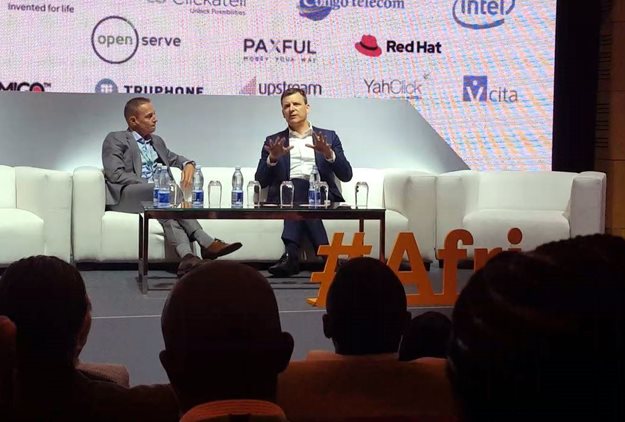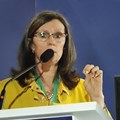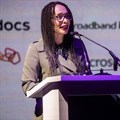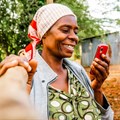#AfricaCom: Smartphone costs the biggest barrier to a digitally inclusive Africa

Senior, before kicking off his on-stage interview with Shuter, reiterated why digital inclusivity is so key to Africa's prosperity, citing a 2018 report from the World Economic Forum: "The fourth industrial revolution has the power to reduce inequalities across the world, but doing so requires empowering everybody, regardless of their geography, income, age and gender, and it requires a concerted action and greater collaboration across all players," he said.
The next technological evolution is advancing at an exponential rate and by leaving out some on this journey, we allow the current societal divides and inequalities to deepen, he said. Communication companies, such as MTN, are therefore key role-players in sustainable development via their efforts to bridge the digital divide. The questions Senior then asked of Shuter were centred on what a digitally inclusive Africa might look like and how it is we get there.
Symmetry between digital, financial inclusion
Providing perspective on current accessibility levels on the continent, Shuter said, "When we look across our markets, we see of our 244-odd million customers, only around 87 million are connected to the internet and are using their mobile devices for internet services. That means about two-thirds are really living in a 2G, voice and SMS world."
Layered in this low level of digital inclusion is the notable symmetry with low levels of financial inclusion in Sub-Saharan Africa, said Shuter, in that one-third of the population in the region is connected to the internet and roughly the same fraction is making use of formal banking services. "You can't really be financially included without being able to access the power of the internet; and to access the power of the internet but not be able to stimulate economic activity - it's also not really going to work," he said.
Vital to addressing barriers to inclusion is partnerships. "I think that is really the path to success in the future, said Shuter, "[Acknowledging] that none of us is as smart as all of us." And regulators must form part of these collaborative efforts.
Regulatory dependencies
Considering the role of the various stakeholders in addressing this dual problem, Shuter first pointed to the need for more spectrum, highlighting that the spectrum currently available to South African networks is what it was 20 years ago, and considering data traffic is forecast to increase by five times in the country over the next three to five years, broader spectrum availability is fundamental.
In terms of promoting the accessibility of mobile financial services, regulatory bodies need to become more flexible, said Shuter. "We need to be able to repurpose the distribution network that sells airtime to also be able to sell e-money and receive e-money."
Some African markets do have flexible regulatory regimes, he said, highlighting Rwanda as having a very clear, proactive national digital strategy. The most progressive country for MTN though is Ghana, he said, where there is substantial internet adoption, allowing the company strong mobile financial services and digital enterprise businesses.
Cost of the handset
According to Shuter, average income per capita in the region is $100/month, making the relative cost of handsets a barrier to inclusion. "Imagine if your smartphone cost you 40% of your monthly pay. It's a big purchase for our people and that is why we are struggling, even when we've got coverage, to get adoption."
Looking to address the unaffordability of smartphones in the region, MTN launched its smart feature phone at AfricaCom last year, selling close to 500,000 units across their market. Other operators have followed suit and Shuter sees that as a victory as costs of the technology decrease and there's greater choice for consumers. "Hopefully, many other players will come in with entry-level 3G handsets, other operators will start to market them, and then the ecosystem adjusts. I think the cost of entry-level smart devices today is the biggest barrier to digital adoption," he said.
Describing MTN as Afro-optimists, Shuter said, "Internet adoption is only 20%, banking adoption is only one-third, the enterprise markets are relatively undeveloped. You can say what I just said as a challenge, or you can say what I just said as an opportunity, and we absolutely fundamentally believe it's a major opportunity."

About Sindy Peters
Sindy Peters (@sindy_hullaba_lou) is a group editor at Bizcommunity.com on the Construction & Engineering, Energy & Mining, and Property portals. She can be reached at moc.ytinummoczib@ydnis.Related
How digital wallets are transforming African finance 30 Jan 2025 Post Office Amendment Act parachutes beleaguered service into the digital era 23 Dec 2024 Fintech can bridge the gap in SA's township and rural economy 12 Dec 2024 Octotel and Heart FM join forces to bring free fibre to SOS Children’s Villages in Cape Town 3 Dec 2024 MTN brings 5G to the people with R2,500 ZTE device [updated] 28 Nov 2024 Earn crypto rewards when using Luno Pay at Pick n Pay stores 18 Nov 2024



























